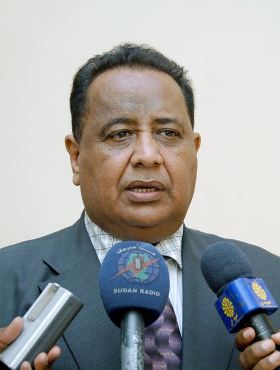Sudan’s Ghandour heads to Washington for talks on bilateral relations
February 7, 2015 (KHARTOUM) – Sudanese government Saturday announced the departure of presidential assistant, Ibrahim Ghandour, to Washington where he will hold direct talks with the American officials on bilateral relations.

The visits of the high ranking Sudanese government officials sparked protests by activists and even some Congressmen, but the State Department confirmed their arrival stressing on the need to communicate important messages to Khartoum.
Diplomatic sources in Khartoum told Sudan Tribune that the presidential aide will meet members of the American administration and Congressmen to discuss a number of issues particularly, peace in Darfur and the Two Areas, external debt relive and bilateral relations.
Ghandour is expected to arrive on Sunday and to start discussions on Monday.
Khartoum complains that US economic sanctions prevents Sudan from joining a debt relief program known as the Heavily Indebted Poor Countries (HIPC) allowing to cancel or reduce the debt repayments of the insolvent east African country.
The International Monetary Fund (IMF) projects Sudan’s external debts to be $48 billion in 2015.
The presidential assistant is also the head the government delegation for the African Union mediated peace talks with the SPLM-N, aiming to end the armed conflict in Blue Nile and South Kordofan.
He is expected to defend the position of his government in the stalled process, but the American officials want a clear commitment to allow humanitarian assistance to civilians in the rebel held areas.
Sources say Washington also hopes to hear Khartoum’s intentions about the national dialogue as the process, which is supposed to end before April elections, did not yet start.
Washington in the past was critical to the rebel groups and their alliance of the Sudanese Revolutionary Forces (SRF) saying they had to develop a clear political agenda and to be more prepared for a negotiated solution.
However since last year, the SRF groups proposed a roadmap for a constitutional dialogue, and signed political declarations on a comprehensive peace and constitutional reforms with the opposition parties.
On the other hand, Khartoum seems reluctant to implement a roadmap prepared by the Peace and Security Council of the African Union since last September to facilitate a cessation of hostilities in the Two Areas and Darfur and to prepare national dialogue process.
(ST)
